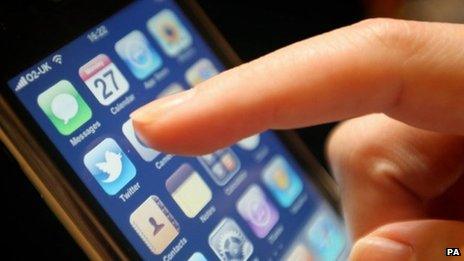Police investigate West Midlands pupils over 'sexting'
- Published
Police officers are visiting schools teaching them the dangers of "sexting"
More than 100 pupils were investigated last year for offences related to 'sexting', two police forces have revealed.
West Mercia Police said it investigated 74 people aged between 10 and 17 in 2015 over explicit messages, some containing naked images.
Warwickshire Police also investigated 33 people in the same age group.
Officers say people need to be aware of the dangers of being prosecuted for sharing indecent messages.
Sexting can lead to anyone convicted being put on the sex offenders register.
The warnings come ahead of Safer Internet Day, external, on 9 February which urges young people to avoid sharing material online that could be used against them.

Dangers of sexting
Sexting involves either sending or receiving explicit messages and images
Many young people share images or videos without knowing it could be breaking the law
It is a criminal offence to take, share or hold "indecent" photos of anyone under 18
Anyone convicted of an offence can be placed on the sex offenders register
Last year a 14-year-old boy who sent a naked selfie to a girl at school was recorded by police for making and distributing indecent images

Det Ch Insp Sean Paley, from Warwickshire Police and West Mercia Police specialist operations unit, said parents and teachers also needed to be aware of the risks.
'No control'
"Sexting may be considered harmless fun by some young people but this could not be further from the truth," he said.
"Once an image has been sent the sender has no control of where it ends up and who sees it.
"There can be huge ramifications, leaving people vulnerable to blackmail, bullying and harm, as well as the fact that children who are sexting may actually be committing criminal offences."
Mark Croad, a teacher at John Kyrle High School in Ross-on-Wye - where pupils attended a presentation hosted by local officers - said it was important schools and families made sure young people were safe online.
"The internet and technological devices are very much part of all of their lives these days - it's about using them appropriately," he said.
- Published15 June 2015

- Published10 February 2015

- Published16 October 2013
